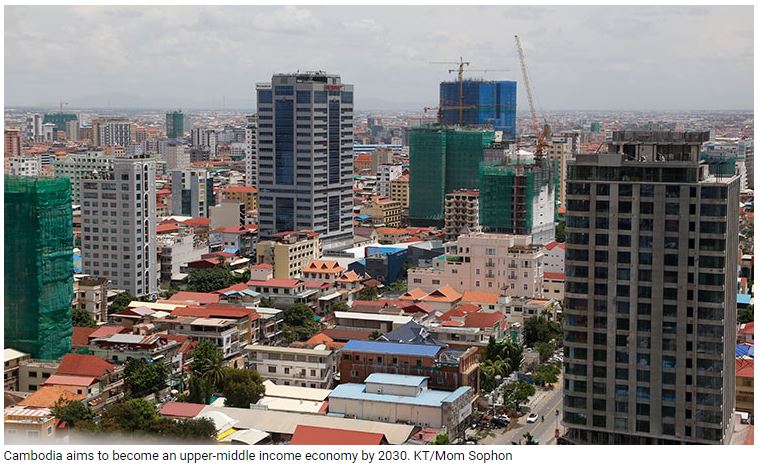Cambodia: Income level target too ambitious: WB
The World Bank yesterday advised Cambodian policymakers to allow more time for the country to become an upper-middle income economy, asking the government to aim for 2035, instead of 2030, to graduate from the current income status.
The recommendation to postpone the target by five years follows a WB revision of the country’s future economic growth, which is now projected at 6.8 percent during the next two years.
Speaking at the launch of WB’s Cambodia Economic Update report yesterday, lead economist Norman V. Loayza said the goal to graduate from the current lower-middle income status, which Cambodia achieved in 2016, in just 13 years is too ambitious.
“First Cambodia should consider delaying the 2030 upper middle-income target to 2035 as the 2030 target is unlikely to be met, given other Asian tiger economies would have missed such a goal when they were at Cambodia’s development level.”
To achieve the 2030 goal, growth in per capita terms would have to equal 9.3 percent on average during the next 13 years, yet per capita growth over that period is projected at between 5-6 percent, WB said in its report.
“If Cambodia continues to grow at current rates at the business-as-usual baselines, the country will miss both the upper-middle income and high-middle income growth targets,” Mr Loayza said.
After achieving upper-middle income status by 2030, Cambodia aims to become a high-middle income economy by 2050.
Even graduating from its current income status by WB’s recommended date will not come without challenges. Cambodia needs to focus on developing its human capital and boosting productivity, WB says.
Likewise, public investment will need to increase by at least 28.5 percent of GDP by 2030, while the savings rate will need to grow by around 11 percentage points of GDP to fund the increased investment required to achieve the growth goals and reduce dependence on foreign savings.
“As it was shown by the study, if we do not change our approach, we may not be able to achieve the goal,” said Sodeth Ly, WB senior country economist.
“We only have 13 years left, so we have to hurry up. If we don’t change, there is not much of a chance of achieving the target,” he said.
Chheang Vanarith, deputy director at the General Department of Policy, welcomed the recommendations but said he still considers the government’s 2030 goal to be feasible.
“Overall, I agree with the study,” Mr Vanarith said, adding, however, that he “still think we can achieve our target by 2030.”
He explained that the methodology used in the WB study is different from the governments’ which leads to different results.
“In Cambodia, every five years we develop a rectangular strategy. Now we are in Phase four, and after that we are going to develop the national strategic development plan to help policymakers achieve the target,” Mr Vanarith said.
According to the WB report, this year GDP will grow by 7.1 percent, which is marginally higher than in 2017, due primarily to strong domestic consumption and exports.
That growth outlook is projected to ease slightly to 6.8 percent over the next two years.
The favorable longer-term outlook is boosted by rising foreign direct investments inflows to manufacturing and agriculture, and improved supply chain linkages between FDI and Cambodian firms.
However, the reports points out that risks in the financial sector continue to grow due particularly to exposure to the construction and real estate sectors.
Moreover, it warns that, given Cambodia’s increased dependency on China for FDI, tourism, and official development assistance, a sharp downturn in the Chinese economy would diminish Cambodia’s growth outlook in the short and medium terms.
Source: https://www.khmertimeskh.com/50554010/income-level-target-too-ambitious-wb/


 English
English




